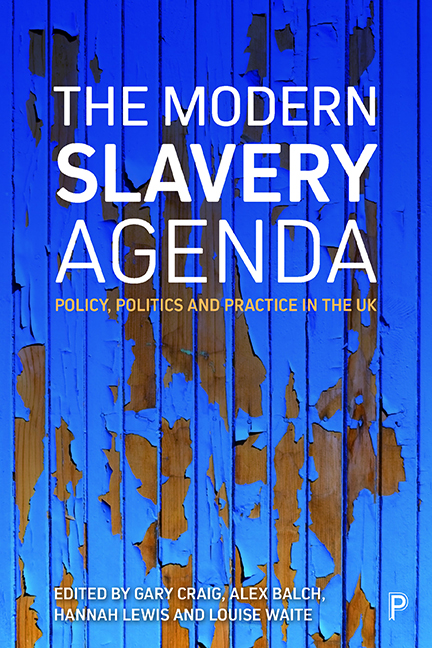Book contents
- Frontmatter
- Dedication
- Contents
- List of tables, figures and boxes
- Notes on contributors
- Editorial introduction: the modern slavery agenda: policy, politics and practice
- one Modern slavery in global context: ending the political economy of forced labour and slavery
- two The UK’s response to modern slavery: law, policy and politics
- three Defeating ‘modern slavery’, reducing exploitation? The organisational and regulatory challenge
- four Class Acts? A comparative analysis of modern slavery legislation across the UK
- five Child trafficking in the UK
- six Human trafficking: addressing the symptom, not the cause
- seven Still punishing the wrong people: the criminalisation of potential trafficked cannabis gardeners
- eight Modern slavery and transparency in supply chains: the role of business
- nine Migrant illegality, slavery and exploitative work
- ten The UK’s approach to tackling modern slavery in a European context
- Index
four - Class Acts? A comparative analysis of modern slavery legislation across the UK
Published online by Cambridge University Press: 20 April 2022
- Frontmatter
- Dedication
- Contents
- List of tables, figures and boxes
- Notes on contributors
- Editorial introduction: the modern slavery agenda: policy, politics and practice
- one Modern slavery in global context: ending the political economy of forced labour and slavery
- two The UK’s response to modern slavery: law, policy and politics
- three Defeating ‘modern slavery’, reducing exploitation? The organisational and regulatory challenge
- four Class Acts? A comparative analysis of modern slavery legislation across the UK
- five Child trafficking in the UK
- six Human trafficking: addressing the symptom, not the cause
- seven Still punishing the wrong people: the criminalisation of potential trafficked cannabis gardeners
- eight Modern slavery and transparency in supply chains: the role of business
- nine Migrant illegality, slavery and exploitative work
- ten The UK’s approach to tackling modern slavery in a European context
- Index
Summary
Introduction
In June 2013, the Human Trafficking and Exploitation (Further Provisions and Support for Victims) Bill was introduced into the Northern Ireland Assembly. Its introduction was shortly followed by an announcement in the autumn of 2013 by the-then Home Secretary, Theresa May, of plans to introduce a modern slavery Act in England and Wales, and the launch of Jenny Marra MSP's consultation on a Human Trafficking Bill in Scotland. By the following year, draft Bills on human trafficking and related forms of exploitation were being scrutinised by the respective Parliaments in each of the UK's three jurisdictions (England and Wales, Northern Ireland, and Scotland), and by 2015, three new Acts had passed into law: the Modern Slavery Act (MSA), the Human Trafficking and Exploitation (Criminal Justice and Support for Victims) Act (hereafter, Northern Ireland Act), and the Human Trafficking and Exploitation (Scotland) Act (hereafter, the ‘Scotland Act’).
The introduction of the legislation was widely welcomed by non-governmental organisations (NGOs) and legal professionals involved in anti-trafficking work. The Anti-Trafficking Monitoring Group (ATMG 2013) highlighted the need for improved legislation and called for the introduction of a new, comprehensive anti-slavery law. Given the importance of this new legislation, a significant amount of time and expertise was dedicated to scrutinising and strengthening the Acts. Through collaborative working and the commitment of parliamentarians, the government and NGOs, the legislation was very significantly improved. The three Acts are comprehensive in scope and include: a raft of new criminal offences; measures aimed at preventing modern slavery; support provisions for child and adult victims; and, in the MSA, the role of an Independent Anti-Slavery Commissioner and a ‘Transparency in Supply Chains’ provision, aimed at improving businesses’ response to slavery and exploitation.
The MSA was heralded – at least in government – as ‘world-leading’ and the ‘first legislation of its kind in Europe’. While it may be true that the Scotland and Northern Ireland Acts are not as broad in scope as the MSA, due to the reserved powers of the UK Parliament, closer inspection of comparable provisions across the three Acts shows that the MSA is, in a number of areas, weaker than its counterparts, let alone legislation in jurisdictions outside the UK.
- Type
- Chapter
- Information
- The Modern Slavery AgendaPolicy, Politics and Practice in the UK, pp. 97 - 120Publisher: Bristol University PressPrint publication year: 2019



